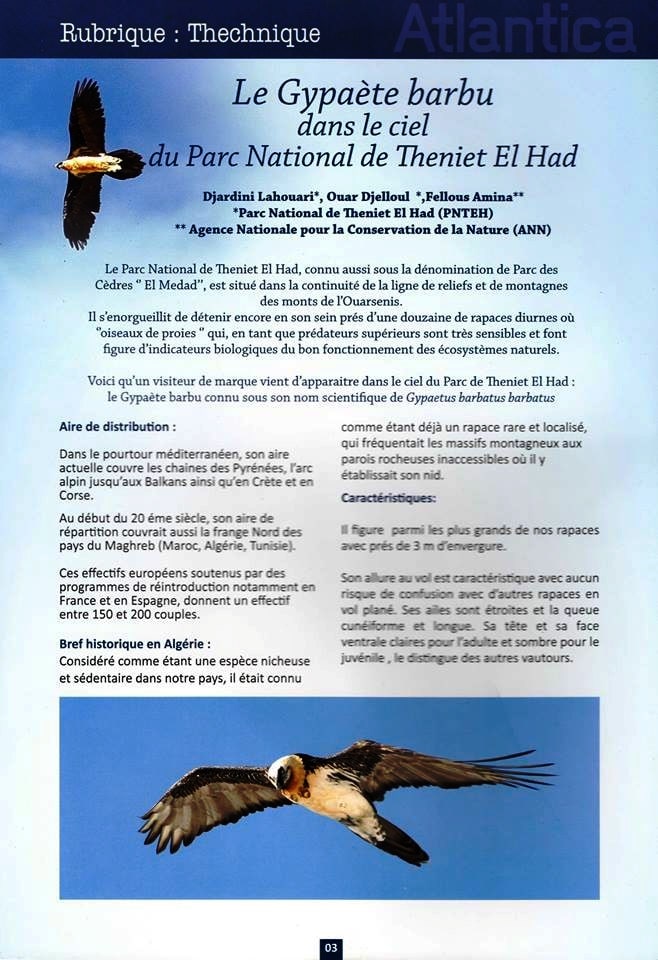Recent sightings of Bearded Vulture in a National Park in Algeria give new hope that the species may still survive in the country.

This is definitely good news for the species in Algeria and the whole of Northwest Africa. The news was released by the staff of the Theniet El Had National Park (Lahouari Djardini and Djelloul Ouar) and the Algeria’s National Agency for the Conservation of Nature (Amina Fellous) in a brief report entitled “Le Gypaète barbu dans le ciel du Parc National de Theniet El Had” published in the bulletin of the Theniet El-Had National Park, Atlantica. The scanned pages of this report are available at the end of the blog-post:
In the ‘Recent observations’ section of the report, the authors wrote: “Additional new observations in the springs of 2012 and 2014 of adults gliding over the hills of the Theniet El Had National Park, have re-given life-breath to the team of the Park to deepen its knowledge of this very rare raptor particularly its use of territory and its selected biological corridors. A monitoring work is under development”.
Better still, the first sentence of this paragraph is understood that there are other previous sightings not mentioned in the text (in other words, the frequent observations are a good indication that the species is breeding there or somewhere near rather than a vagrant from far away).
The Bearded Vulture population in Morocco is also very small and endangered. With this good news from Algeria, at least we can’t say that the North African population is only present in Morocco. Yes, it is still endangered but its presence in more than one sub-population is much better.
Excerpt from the report:
De nouvelles observations supplémentaires aux printemps 2012 et 2014 d’adultes planant sur les hauteurs du Parc National de Theniet El Had, ont redonné du souffle à l’équipe du Parc afin d’approfondir ses connaissances sur ce très rare rapace particulièrement sur son utilisation du territoire, et sur ses corridors biologiques choisis. Un travail d’investigation et de suivi et en cours d’élaboration.
Why the word ‘extinct’ should be avoided?
In a short note about the Bearded Vulture in Morocco, Cherkaoui (2005) briefly mentioned “…and probably now extinct in Algeria and Tunisia“. Similarly, Godino et al. (2005) wrote: “La población de Quebrantahuesos de Marruecos, la única que mantiene la especie en el norte de África…” (= in both papers, the authors implied that the species is extinct in Algeria and Tunisia). I think that the word “extinct” should be avoided unless there is strong evidence based on facts that a species is indeed extinct in a given region or country. A similar case was the ‘announcement’ of the extinction of the Andalusian Buttonquail by Violani & Massa (1993). This was later proven wrong as the species still occurs in the Doukkala region of Morocco and also in Algeria.
References:
Cherkaoui, I. 2005. The Bearded Vulture Gypaetus barbatus in Morocco. Vulture News 52: 37.
Djardini, L. Ouar, D. & Fellous, A. 2014. Le Gypaète barbu dans le ciel du Parc National de Theniet El Had. Atlantica 1: 3-4.
Godino, A., Paz, J. L. & Simón, M. Á. 2005. No deja de disminuir la población marroquí de Quebrantahuesos. Quercus (233): 8.
Violani, C. G. & Massa, B. 1993. Extinction of the Andalusian Hemipode Turnix s. sylvatica (Desf.) in the Mediterranean region. Bull. B.O.C. 113: 225–229.

